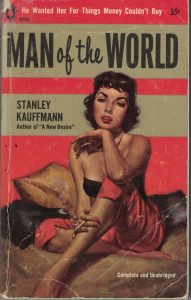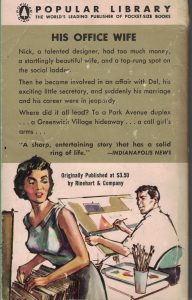 In the annals of 1950s cheesy paperback covers, surely Man of the World should feature somewhere. The sell line (“He wanted her for things money couldn’t buy”) drips innuendo, without actually saying anything. The babe on the cover is sultry. The promise that it’s “complete and unabridged” suggests that there are naughty bits that a more timid publisher might have expurgated. I found nothing that by current standards would be considered naughty.
In the annals of 1950s cheesy paperback covers, surely Man of the World should feature somewhere. The sell line (“He wanted her for things money couldn’t buy”) drips innuendo, without actually saying anything. The babe on the cover is sultry. The promise that it’s “complete and unabridged” suggests that there are naughty bits that a more timid publisher might have expurgated. I found nothing that by current standards would be considered naughty.
Growing up, this book was among the hundreds of paperbacks from the 50s and 60s that lined the walls in my parents’ house. I read a lot of them, but only recently have I tried to read this one. There’s a reason for that: is is supposedly based on my parents’ courtship.
My father was a graphic designer working for David Selznick in Hollywood when my mother came to interview for a secretarial job. I don’t know that she was actually his secretary (by the time I wanted to ask questions, my parents’ relationship had degraded to the point where neither of them wanted to talk about it) but she caught his eye. And within a year or so both of them had relocated to New York City, and my mother was working as a secretary to film critic Stanley Kauffmann, who (according to family lore) had a crush on my mother. And somehow Stanley decided to make Mom (and therefore Dad) the centerpiece of his new novel. So I had to go digging through it, looking for clues about these people before I knew them. An archeological dig, as it were.
Reading this book is weird. I’m not a big fan of mid-20th century male-angst fiction (which is how I would classify this book). But every now and then there is a sentence or a description that makes me sit up and think Oh My God: These Are My Parents.
 When my parents met my father was married to a woman named Kit, who was a model, Vogue Magazine beautiful, and apparently a… difficult person. According to the novel, the protagonists (Nick and Delia) have a rather chaste thing going on–she lives with her mother, as my mother did–and they go to the movies or out to dinner. Early on in the book she decides this is going nowhere, and moves to New York. Okay, so far it jibes with family lore. My mother moved to New York and lived in a walk-up over a men’s haberdashery across 6th Avenue from the Women’s House of Detention on 9th Street. My father moved back to New York, having split with the beautiful Kit. He had an apartment-and-studio on 11th Street. Somehow they got back together.
When my parents met my father was married to a woman named Kit, who was a model, Vogue Magazine beautiful, and apparently a… difficult person. According to the novel, the protagonists (Nick and Delia) have a rather chaste thing going on–she lives with her mother, as my mother did–and they go to the movies or out to dinner. Early on in the book she decides this is going nowhere, and moves to New York. Okay, so far it jibes with family lore. My mother moved to New York and lived in a walk-up over a men’s haberdashery across 6th Avenue from the Women’s House of Detention on 9th Street. My father moved back to New York, having split with the beautiful Kit. He had an apartment-and-studio on 11th Street. Somehow they got back together.
There are the bones of that story in the book (I will confess I’ve read about half of it and only skimmed the rest). It’s the details–particularly about Delia–that are so startling, that hit me with the force of accuracy, even when it was something I’d never considered before. Here’s one:
With one letter he dictated, he asked her to enclose a memo that his former secretary had typed before she left, Delia retyped the memo.
“Why?” he asked. “What was wrong with it?”
“I–I’m sorry,” she said, and shrugged. She frequently stuttered when she was the least bit disturbed. “I–I know she was your secretary and very nice and so on, but I just don’t call that good typing.”
“Why not?”
“L-look at the spacing. It’s spotty. And some words lighter than others. Like there.”
“You know that you’re slightly nuts?”
“I can’t help it. I like it to look nice.”
And my first thought, after slightly nuts? was Holy crap, that’s my mother, the woman who could type 105 words a minute on a Remington manual typewriter. The woman who was given raise after raise at Bantam books, because they wanted her to keep doing secretarial work because she was so damned good at it.
The bits where I recognize my father are less startling, but ring almost as true (Kauffmann didn’t have a crush on my father, after all). I wish I’d read this book decades ago, when it was still possible to ask my parents about some of it. Are any of the plot details–beyond the ones I’ve related above–remotely accurate? I’m not certain I would have gotten much out of them–they really didn’t talk about their early relationship even before that relationship started shredding. But with this book as a starting point I could have asked some questions.
My mother died in 1986; my father died in 2011. No matter how carefully I comb through the pages of Man of the World, I’m not going to know the truths about their early years. And yet I keep paging through, looking for clues.
